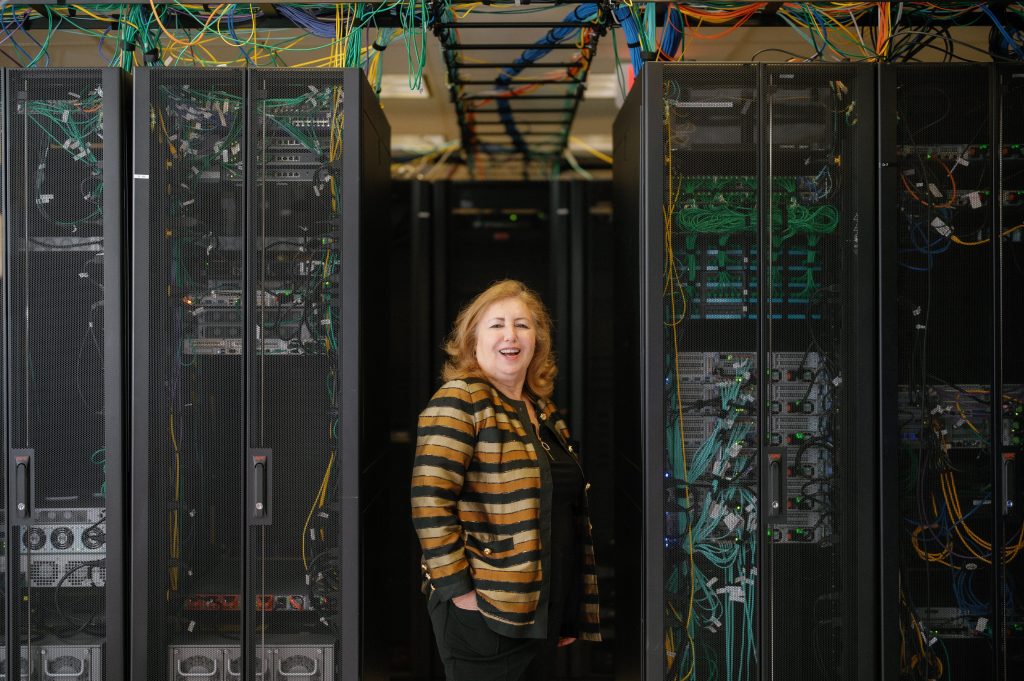In an era where cyber threats are growing more sophisticated and the digital-physical divide is shrinking, cybersecurity has become a matter of national and civic importance. At the forefront of this battle is Dr. Yelena Yesha, a professor and IDSC Knight Foundation Endowed Chair of Data Science and AI at the University of Miami. She also serves as Innovation Officer at the Frost Institute for Data Science and Computing (IDSC) and Director of IDSC’s AI + Machine Learning program, helping faculty connect with government and industry partners to turn research into impactful innovations.
A prolific scholar, Dr. Yesha has authored or edited 11 books and over 200 publications, with over $65 million in research funding. Her current work spans blockchain, cybersecurity, and big data applications in areas such as e-commerce, climate change and digital healthcare. She is also a fellow of the IBM Centre for Advanced Studies.
CARTA: Addressing Critical National Infrastructure
Dr. Yesha is the Founding Director of the Center for Accelerated Real Time Analytics (CARTA), a multi-university collaboration focused on advancing real-time data analytics through industry-academic partnerships. Her leadership in CARTA, as well as another major initiative, the newly launched Cybersecurity Research Collaborations for Resilient Critical Systems in Florida, is shaping the way government, academia, and industry approach the protection of critical infrastructure.
 CARTA, backed by the U.S. Department of Homeland Security (DHS), exemplifies a high-impact, forward-thinking research initiative addressing national cyber-physical security challenges. With a particular focus on protecting vital systems like seaports, transportation networks, and public utilities, CARTA is tasked with developing innovative technologies that make these systems more resilient in the face of modern threats. Professor of Professional Practice Dr. Stephen Dennis joined Dr. Yesha as Co-Principal Investigator for the CARTA project.
CARTA, backed by the U.S. Department of Homeland Security (DHS), exemplifies a high-impact, forward-thinking research initiative addressing national cyber-physical security challenges. With a particular focus on protecting vital systems like seaports, transportation networks, and public utilities, CARTA is tasked with developing innovative technologies that make these systems more resilient in the face of modern threats. Professor of Professional Practice Dr. Stephen Dennis joined Dr. Yesha as Co-Principal Investigator for the CARTA project.
“The CARTA initiative exemplifies why collaboration across entities is critical to help focus research. We have stakeholders with different roles and responsibilities providing feedback on our efforts, which only improves research efficiencies and productivity,” Dennis said.
The primary goal of DHS’s funding for CARTA is to support research that aligns with strategic national priorities, especially the protection of critical infrastructure through advanced analytics and modeling. CARTA’s research focuses heavily on digital twin technology, which is where virtual replicas of physical systems allow for real-time simulation, monitoring, and response.
By building these digital twins, researchers can anticipate system vulnerabilities, simulate attacks, and test response strategies without disrupting the real-world infrastructure. “We are exploring technical architectures that merge machine learning, edge computing, and real-time data analytics,” Dr. Yesha said. These systems allow decision-makers to act swiftly and accurately in the face of emerging threats.
The architectures and methodologies being investigated include distributed sensor networks, AI-enhanced simulation environments, and autonomous system-monitoring tools. These tools are designed to detect and respond to threats but to do so in ways that scale across complex, interconnected infrastructures.
Yet, as powerful as digital twins are, their automated creation poses significant risks. A key challenge is ensuring that automatically generated models are both accurate and secure. Faulty models could lead to misinformed decisions, while unsecured models may become attack vectors themselves. CARTA researchers are tackling this issue by implementing rigorous validation protocols, transparent model-generation pipelines, and cybersecurity layers that protect both data and algorithms.
To accelerate innovation and ensure impact, CARTA is deeply committed to collaboration among academia, industry, and government. Annual workshops and cross-sector meetings provide platforms for idea exchange, project updates, and strategic planning. This structure ensures that CARTA’s work is both cutting-edge and aligned with stakeholder needs—especially those of national infrastructure owners and operators.

Boosting Cybersecurity for the State of Florida
While CARTA focuses on national-scale infrastructure resilience, Dr. Yesha’s second initiative zeroes in on a more localized, yet equally critical mission: protecting the State of Florida’s information systems and digital infrastructure. Launched just months ago, the Cybersecurity Research Collaborations for Resilient Critical Systems in Florida represents a unified, multi-institutional approach to defending against cyber threats across the state.
Florida ranks among the top three states
in the U.S. most affected by cybercrime.
Florida ranks among the top three states in the U.S. most affected by cybercrime, making this initiative especially urgent. The new research center, led by UM in collaboration with state government and other Florida academic institutions, is designed to act as a nerve center for cybersecurity innovation, workforce development, and rapid threat mitigation.
The mission of the center is twofold: first, to develop technologies and strategies that can protect Florida’s critical infrastructure from evolving cyber threats; and second, to turn cutting-edge research into actionable resilience practices. This includes not only defending against immediate threats, like ransomware and network breaches, but also fortifying systems that govern public utilities, transportation, and emergency response operations.
One of the defining features of the initiative is its collaborative approach to identifying research priorities. Working closely with the Florida Chief Information Security Officer and other government leaders, UM and its academic partners will help shape a dynamic research agenda that reflects the most pressing threats and opportunities. Through rotational leadership and shared governance, the participating universities ensure that the initiative remains agile, inclusive, and impactful.
As for specific technologies, the center will explore a range of cybersecurity defenses, including AI-driven threat detection, real-time vulnerability assessment tools, secure cloud computing infrastructures, and blockchain-based data integrity solutions. These technologies aim to provide both preventative and responsive measures to safeguard state-run digital ecosystems.
“Protecting critical infrastructure is not just about technology; it’s about partnership, foresight, and building systems that can withstand the unexpected.”
But innovation alone is not enough—translation into practice is key. The center is intentionally structured to bridge the academic and practical worlds. By embedding real-world problems into academic research and turning scholarly insights into deployable solutions, the center ensures that its work directly contributes to the resilience of Florida’s computing and information systems.
Dr. Yesha is especially focused on the human element of cybersecurity. The initiative emphasizes talent development as a cornerstone of its strategy. Faculty and students at UM will not only conduct critical research but also engage in hands-on training, internships and collaborative projects with industry and government partners.
“We’re building the next generation of cyber defenders right here in Florida,” Dr. Yesha noted. “Graduate and undergraduate students will have unique opportunities to contribute to impactful research while gaining the skills required to lead future security initiatives.”
A New Standard of Resilience
Through her leadership in both CARTA and the Florida cybersecurity consortium, Dr. Yesha is demonstrating what it means to turn academic research into meaningful public impact. These projects do not exist in silos; they are synergistic. CARTA’s breakthroughs in digital twin modeling will inform the tools used in Florida’s infrastructure defense. Conversely, Florida’s real-world cybersecurity challenges will feed back into national research agendas, ensuring that both efforts remain grounded in practical relevance.
By linking advanced data science, AI, and cybersecurity in strategic, collaborative environments, Dr. Yesha is helping to set a new standard for resilience in the digital age. With threats increasing in frequency and sophistication, these efforts could not come at a more critical time for Florida and for the nation as a whole.
As Dr. Yesha puts it, “Protecting critical infrastructure is not just about technology; it’s about partnership, foresight, and building systems that can withstand the unexpected. That’s the future we’re creating, together.”
by Kimberly Bobson Feldman
At the University of Miami, Dr. Yelena Yesha was honored as the Knight Foundation Endowed Chair in Data Science (part of the 100 Centennial Talents), established by contributions from Phillip and Patricia Frost and the John S. and James L. Knight Foundation. FORBES magazine highlighted Dr. Yesha’s accomplishments in technology in a two-part profile: Part I: Dr. Yelena Yesha: Meet The Tenacious Pioneer Pushing Innovation To Address Real World Problems and Part II: Dr. Yelena Yesha: Pushing Technology Boundaries To Solve The World’s Biggest Problems, and covered her recent work with NASA here: Revolutionizing Satellite Security: NASA’s Groundbreaking Project To Integrate AI, Blockchain, & Nanosatellites.





